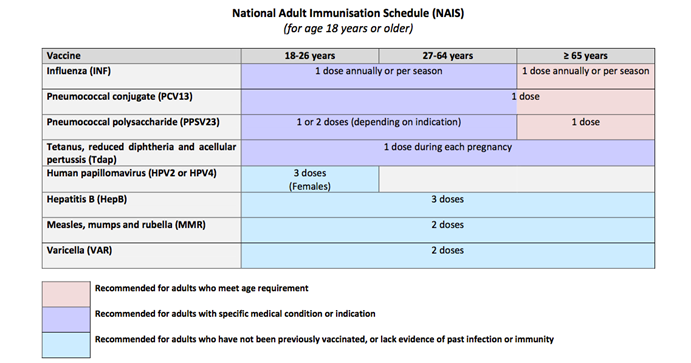Why should I get vaccinated?
Two reasons: To protect yourself and to protect those around us.
- Vaccination protects you from infectious diseases. If you do get an infection, being vaccinated can keep you from becoming severely ill. Even if you've received the vaccines you needed as a child, the protection from some vaccines can wear off. As an adult, you may also be at risk for other vaccine-preventable illnesses due to your lifestyle, travel, job, pregnancy, or pre-existing medical conditions.
- Vaccination can help with herd immunity, which reduces the spread of viruses and prevents disease outbreaks in the community. There are certain groups of people who cannot be vaccinated due to age or health condition, and they depend on others being vaccinated to keep them safe from these diseases.
How do vaccines work?
Vaccines uses your body’s natural defenses to build resistance to certain infections. It stimulates your immune system to produce antibodies, similar to how it would after a natural infection. This prepares your immune system to fight off germs if you are exposed to them in the future. Your chances of getting certain diseases are thus lowered.
Are vaccines safe?
Vaccines have a long record of being a safe and effective way of preventing disease. Before a vaccine is approved for use, it goes through rigorous testing to ensure it is safe. This involves running multiple phases of clinical trials with lots of people who volunteer to try the vaccine. Researchers study how well the vaccine works during these trials and how many people had side effects. The results are then reviewed by experts who must agree that the vaccine is safe and effective enough to be given to the public. For use in Singapore, vaccines have to be registered with the Health Sciences Authority (HSA). HSA regulates health products and ensures public health is safeguarded.
Is it better to get natural immunity than to get vaccinated?
Having an infection can indeed protect you from getting it again in the future. However, if you are infected before you get vaccinated, you are at risk of falling seriously ill. The infection can lead to complications, disabilities, and even death. You could also spread the infection to other people who are at risk of getting seriously ill.
Furthermore, unlike bacteria and viruses, vaccines do not make you sick. Vaccines help strengthen your immune system and protect you from potentially life-threatening complications.
Do vaccines have side effects?
Vaccines can have side effects that are usually mild and temporary, such as:
- Redness, swelling, or pain at the site of injection
- Low-grade fever
- A mild rash
-
Headache or body aches
More serious side effects, such as severe allergic reactions, do occur, but these are very rare.
Who should not be vaccinated?
Persons who have had a severe allergic reaction after a previous vaccination or allergies to specific vaccine components should not receive the vaccine.
If you have a history of allergic reactions to particular foods, medications, or ingredients, you may need to avoid certain vaccines.
Those who are severely immunocompromised or are pregnant should not receive live vaccines such as MMR or varicella vaccines.

What vaccines should adults get and when?
In general, people need different vaccines at different times, depending on the situation.
Adults sometimes need vaccines that they never got as children.Travellers sometimes need vaccines against infections that exist in the area they are visiting. These should be administered 10 to 14 days before departure.
When a new infection spreads, people might need to get a new vaccine. For example, vaccines for the coronavirus disease 2019 (COVID-19) that emerged in December 2019.
The
National Adult Immunisation Schedule (NAIS) provides guidance on vaccinations that persons age 18 years or older should adopt to protect themselves against vaccine-preventable diseases.

NAIS comprises seven types of vaccines that protect against 11 diseases:
- Influenza
- Pneumococcal (PCV13/PPSV23)
- Human Papillomavirus
- Tetanus, Diphtheria, and Pertussis (Tdap)
- Measles, Mumps, and Rubella (MMR)
- Hepatitis B
- Varicella
Who is more vulnerable and would benefit from vaccination?The following groups of people are more susceptible to falling seriously ill from infectious diseases:
- Seniors aged 65 and above
- Young children
- Adults with certain medical conditions or are immunocompromised who have a higher risk of developing complications from an infection
- Pregnant women
Getting the recommended immunisations plays a crucial role in protecting your health throughout your life. Our team of doctors can talk to you about your vaccination needs. They will also assess your suitability to receive the recommended vaccines based on your situation. The recommendation will depend on what vaccines you have received in the past as well as your risk factors.
